External links
- Gallery of The Fosdyke Saga books
- The Fosdyke Saga (1977) (TV) at IMDb
- Fosdyke Saga radio serial Archived 20 December 2018 at the Wayback Machine
- Autobiography of Bill Tidy Archived 24 October 2007 at the Wayback Machine
| The Fosdyke Saga | |
|---|---|
| Author(s) | Bill Tidy |
| Launch date | March 1971 |
| End date | February 1985 |
| Publisher(s) | Daily Mirror |
| Genre(s) | Humour |
The Fosdyke Saga was a British comic strip by cartoonist Bill Tidy, published in the Daily Mirror newspaper from March 1971 - February 1985. Described as "a classic tale of struggle, power, personalities and tripe", the strip was a parody of John Galsworthy's classic novel series The Forsyte Saga . However, the slightly bizarre and strange antics of the characters and those around them had a Lancashire/Cheshire lean, with mangles, chimneys and soot ever-present.
The Fosdyke Saga was the story of Roger Ditchley, a wastrel son of a tripe magnate, Old Ben Ditchley, who was deliberately disinherited by his father in favour of Jos Fosdyke. Roger, blinded by rage, seeks to regain his rightful inheritance over the next twelve years. His wicked plans are always thwarted, as he enlists the most inept allies and twisted methods to attain his goal.
The Fosdykes themselves pursue the tripe business in various ways, such as selling alcoholic tripe in the United States during Prohibition. The many Fosdyke children grow up and have adventures of their own, including joining the Royal Flying Corps during World War I.
Each book included bizarre settings, such as the rugby game between a Welsh choir and a lady's casual rugby team held in a Salford hotel (the stairs collapsed in the first half), the hunt for the Tripe Naughtee and the unforgettable "Brain of Salford" competition.
Created and drawn by well-known cartoonist Bill Tidy, who also produced cartoons for the satirical magazine Private Eye and created The Cloggies , the wry humour in this classic 1970s comic strip was very popular, if often unintelligible to those outside of the mid-north-west of England.
The series was axed from the Daily Mirror in 1985, the year after tycoon Robert Maxwell had purchased Mirror Group Newspapers.
The Fosdyke Saga has been adapted as a TV series (starring Roger Sloman and Sherrie Hewson), a radio serial by the BBC and a stage play.
The radio adaptation starred (among others) Miriam Margolyes, Enn Reitel, Christian Rodska and David Threlfall.

A comic strip is a sequence of cartoons, arranged in interrelated panels to display brief humor or form a narrative, often serialized, with text in balloons and captions. Traditionally, throughout the 20th and into the 21st century, these have been published in newspapers and magazines, with daily horizontal strips printed in black-and-white in newspapers, while Sunday papers offered longer sequences in special color comics sections. With the advent of the internet, online comic strips began to appear as webcomics.
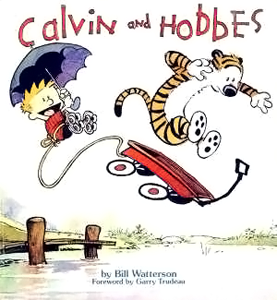
Calvin and Hobbes is a daily American comic strip created by cartoonist Bill Watterson that was syndicated from November 18, 1985, to December 31, 1995. Commonly cited as "the last great newspaper comic", Calvin and Hobbes has enjoyed broad and enduring popularity, influence, and academic and philosophical interest.

A cartoon is a type of visual art that is typically drawn, frequently animated, in an unrealistic or semi-realistic style. The specific meaning has evolved, but the modern usage usually refers to either: an image or series of images intended for satire, caricature, or humor; or a motion picture that relies on a sequence of illustrations for its animation. Someone who creates cartoons in the first sense is called a cartoonist, and in the second sense they are usually called an animator.

Dilbert is an American comic strip written and illustrated by Scott Adams, first published on April 16, 1989. It is known for its satirical office humor about a white-collar, micromanaged office with engineer Dilbert as the title character. It has led to dozens of books, an animated television series, a video game, and hundreds of themed merchandise items. Dilbert Future and The Joy of Work are among the best-selling books in the series. In 1997, Adams received the National Cartoonists Society Reuben Award and the Newspaper Comic Strip Award for his work. Dilbert appears online and as of 2013 was published daily in 2,000 newspapers in 65 countries and 25 languages.

Dick Tracy is an American comic strip featuring Dick Tracy, a tough and intelligent police detective created by Chester Gould. It made its debut on Sunday, October 4, 1931, in the Detroit Mirror, and it was distributed by the Chicago Tribune New York News Syndicate. Gould wrote and drew the strip until 1977, and various artists and writers have continued it. Dick Tracy has also been the hero in a number of films, including Dick Tracy in which Warren Beatty played the lead in 1990. Tom De Haven praised Gould's Dick Tracy as an "outrageously funny American Gothic", while Brian Walker described it as a "ghoulishly entertaining creation" which had "gripping stories filled with violence and pathos".
Chester Gould was an American cartoonist, best known as the creator of the Dick Tracy comic strip, which he wrote and drew from 1931 to 1977, incorporating numerous colorful and monstrous villains.

Andy Capp is a British comic strip created by cartoonist Reg Smythe, seen in the Daily Mirror and the Sunday Mirror newspapers since 5 August 1957. Originally a single-panel cartoon, it was later expanded to four panels.

Mutt and Jeff was a long-running and widely popular American newspaper comic strip created by cartoonist Bud Fisher in 1907 about "two mismatched tinhorns". It is commonly regarded as the first daily comic strip. The concept of a newspaper strip featuring recurring characters in multiple panels on a six-day-a-week schedule had previously been pioneered through the short-lived A. Piker Clerk by Clare Briggs, but it was Mutt and Jeff as the first successful daily comic strip that staked out the direction of the future trend.
William Edward Tidy, MBE was a British cartoonist, writer and television personality, known chiefly for his comic strips. He was noted for his charitable work, particularly for the Lord's Taverners, which he supported for over 30 years. Deeply proud of his working-class roots in Northern England, his most abiding cartoon strips, such as The Cloggies and The Fosdyke Saga, were set in an exaggerated version of that environment.
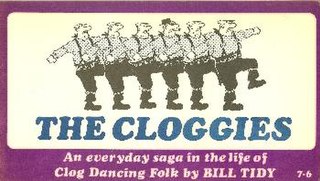
The Cloggies, an Everyday Saga in the Life of Clog Dancing Folk, is a cartoon strip created by Bill Tidy. It ran in the satirical magazine Private Eye from 1967 to 1981, and later in The Listener from 1985 to 1986.
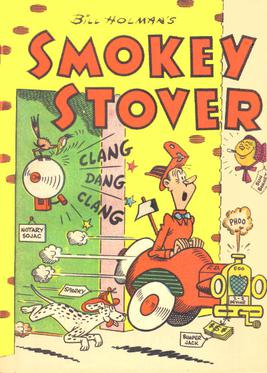
Smokey Stover is an American comic strip written and drawn by cartoonist Bill Holman from March 10, 1935, until he retired in 1972 and distributed through the Chicago Tribune. It features the misadventures of the titular fireman.
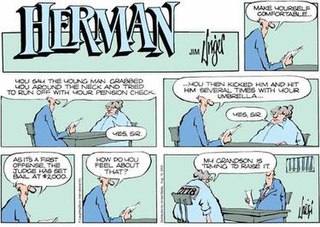
Herman is a comic strip written and drawn by Jim Unger. While the daily ran as a single panel with a typeset caption, it expanded every Sunday as a full multi-panel strip with balloons.
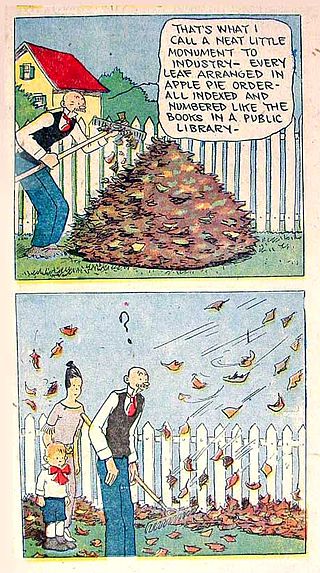
The Gumps is a comic strip about a middle-class family. It was created by Sidney Smith in 1917, launching a 42-year run in newspapers from February 12, 1917, until October 17, 1959.

King Features Syndicate, Inc. is an American content distribution and animation studio, consumer product licensing and print syndication company owned by Hearst Communications that distributes about 150 comic strips, newspaper columns, editorial cartoons, puzzles, and games to nearly 5,000 newspapers worldwide. King Features Syndicate also produces intellectual properties, develops new content and franchises, like The Cuphead Show!, which it produced with Netflix, and licenses its classic characters and properties.
Frank Bellamy was a British comics artist, best known for his work on the Eagle comic, for which he illustrated Heros the Spartan and Fraser of Africa. He reworked its flagship Dan Dare strip.

Skippy is an American comic strip written and drawn by Percy Crosby that was published from 1923 to 1945. A highly popular, acclaimed and influential feature about rambunctious fifth-grader Skippy Skinner, his friends and his enemies, it was adapted into movies, a novel and a radio show. It was commemorated on a 1997 U.S. Postal Service stamp and was the basis for a wide range of merchandising—although perhaps the most well-known product bearing the Skippy name, Skippy peanut butter, used the name without Crosby's authorization, leading to a protracted trademark conflict.
The Los Angeles Times Syndicate was a print syndication service that operated from c. 1949 to 2000. Owned by the Times Mirror Company, it also operated the Los Angeles Times Syndicate International; together the two divisions sold more than 140 features in more than 100 countries around the world. Syndicated features included Pulitzer Prize-winning commentators and columnists, full news and feature services, editorial cartoons and comic strips, online products and photo and graphics packages.

Our Boarding House is an American single-panel cartoon and comic strip created by Gene Ahern on October 3, 1921 and syndicated by Newspaper Enterprise Association. Set in a boarding house run by the sensible Mrs. Hoople, it drew humor from the interactions of her grandiose, tall-tale-telling husband, the self-styled Major Hoople, with the rooming-house denizens and his various friends and cronies.
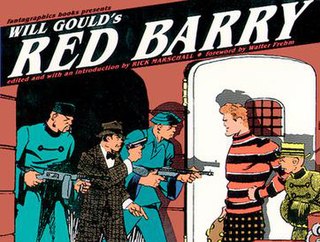
Red Barry is a detective comic strip created by Will Gould (1911–1984) for King Features. The daily strip about two-fisted undercover cop Barry began Monday, March 19, 1934, as one of several strips introduced to compete with Dick Tracy by Chester Gould. A Sunday strip was added on February 3, 1935. The daily strip ran for three years, until August 14, 1937, and the Sunday page ended almost a year later, on July 17, 1938.

The Billy Ireland Cartoon Library & Museum is a research library of American cartoons and comic art affiliated with the Ohio State University library system in Columbus, Ohio. Formerly known as the Cartoon Research Library and the Cartoon Library & Museum, it holds the world's largest and most comprehensive academic research facility documenting and displaying original and printed comic strips, editorial cartoons, and cartoon art. The museum is named after the Ohio cartoonist Billy Ireland.